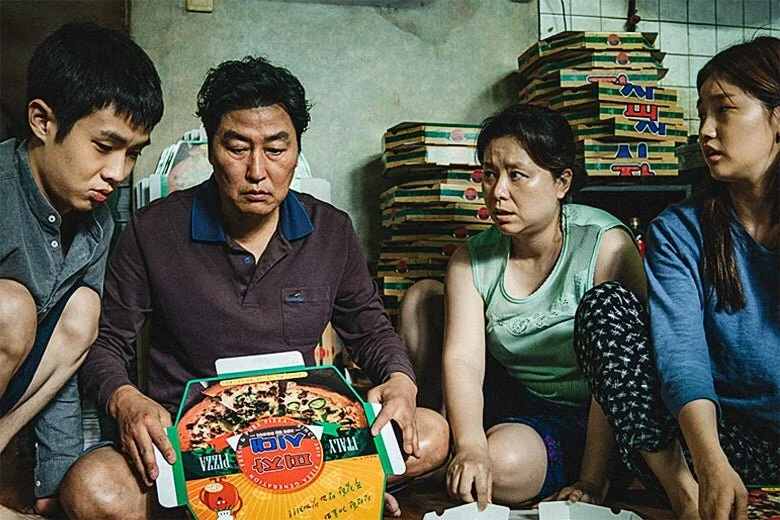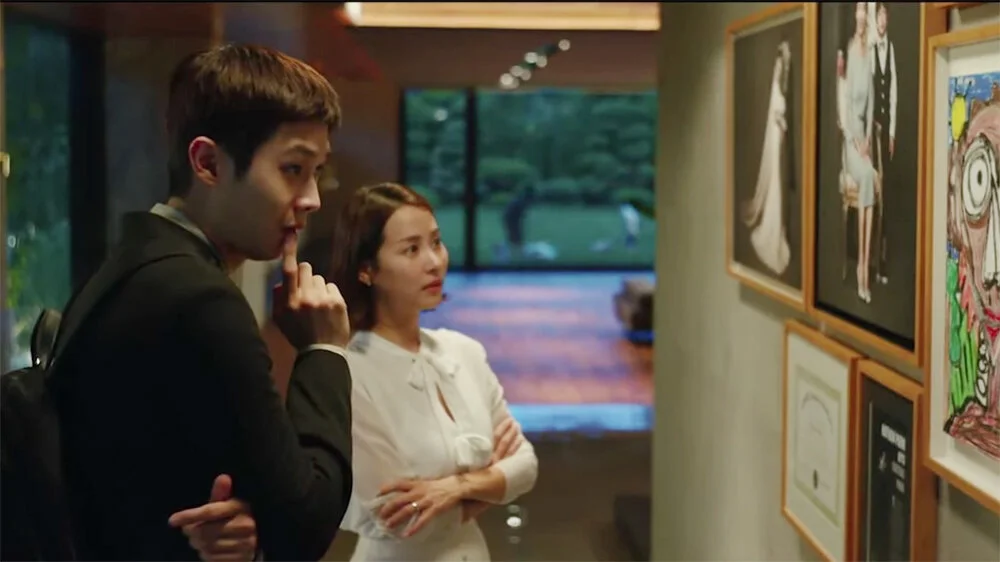Coming fresh out of the theaters, I still cannot stop thinking about Bong Joon-ho’s latest film, Parasite. It is a genre melding, satirical black comedy/horror/mystery/thriller that tells a tale about how a poor family cons their way into service of a rich family.
Similar to Burning which was released last year as the South Korean adaptation of Haruki Murakami’s short story, this film also follows the lives of the upper class and lower class citizens. And as per usual, I, The Writer in the Shell will be using this platform to critique and analyze the layered messages of this modern masterpiece, which I hope will also encourage further discussion for other viewers.
SPOILERS AHEAD!
The Kim Family. From left to right: Ki-woo, Ki-taek, Chung-sook, and Ki-jeong.
Who Are The Parasites?
The titular parasites in the film are the obviously lower class Kim Family. The dictionary definition of a parasite is:
parasite (noun)
an organism that lives in or on an organism of another species (its host) and benefits by deriving nutrients at the other's expense.
The story kicks into gear once Ki-woo’s friend Min decides to leave town for a trip, and passes on the reins of his old tutoring job to his jobless friend living in squalor. As the rest of the family are also unemployed, Ki-woo slowly brings the rest of the Kim family into service of Park household through subterfuge and humorous foul play. Like parasites, they leech off the money and perks of their rich counterparts and start to expand and seep deeper and deeper into their affairs.
The Park Family. Left to right clockwise: Dong-ik, Da-hye, Da-song, and Yeon-gyo
Arguably, there are two other forms of parasites in that the film could be possibly alluding to: The Parks and the couple hiding beneath the basement, Gook Moon-gwang and Geun-sae. Geung-sae in particular is depicted with an unknown mental and physical disability that causes him to behave much like an insect, further drawing similarities to an actual parasite. Together, this couple have been parasites for years with the previous owners, living off the scraps and rustling around the darkness when no one is awake like cockroaches—a commonly recurring theme in the film.
In the way the Kims feed off the wealth of the Parks, the Parks also do the same to the Kims. They are a rich family who cannot hope to do anything else without the help of their staff. They can’t drive, cook, teach, or do anything but throw money at their issues. Their relationship is largely symbiotic, and without each other they cannot survive.
Disparity Between Rich & Poor
Class struggle has often been the centerpiece of many South Korean films, and Parasite is no different. However, Parasite does a splendid job in evenly showcasing two sides of the same coin. Instead of simply vilifying and painting the rich people as the monstrous enemy.
The world’s of these two families live in stark contrast of each other, and the film does not pull any punches to juxtapose these clashing differences.
Their living conditions are exact opposites: the Kims are living in absolute squalor in the lower levels beneath the city, breathing in toxic fumes for free pesticide and wading through the sewer swamps of their destroyed memories when a flood strikes. Meanwhile, the Parks have tents where they play in the rain, sitting high above everyone else with a worry-free lifestyle that is only afforded to those with their income to support it. The Parks throw lavish parties and have vapid conversations because they have nothing else better to do than to showoff their immense fortune. And even when it is pointed out that the Kims all have the same smell, they are oblivious to the secret connection. In short, the money creates disparity between the wealthy and the poor where their worlds run parallel but can never intersect.
The False Promise Of Social Mobility
Despite the quick assimilation into the opulent Park family, the Kim’s ambitions to rise through the ranks and enter the kingdom of prosperity are ultimately doomed to fail. They are all playing up their fictional roles to the best of their abilities, hoping that this will bring their hopes and dreams into a reality. But just like their clever act, their desire to jump into a higher social class is also an act.
At various points in the movie the members of the Park family point out that he has a peculiar scent, one that is both repulsive and pungent. Even switching the detergent cannot wash away their true identities as lower-class citizens. Driving home the fact that he knows that he cannot escape his reality just like he cannot escape his lingering stench. It is a class divide that is too big for them to ever bridge. For even as they work their way up the ladder and gain money through serving the Parks, they are still in service of others and not themselves.
They will still be earning wages and barely getting by just like the previous parasitic houseworker. They have no agency, except to come to the beckoning of call of their masters. When the Park’s are away on vacation the Kims get together and drunkenly house sit and discuss their dreams for the future. They joke around until Chung-sook decides to playfully tease her husband, comparing him to a cockroach. It’s a joke he brushes off, but deep down he believes it to be true as the ramifications of this backhanded comment and the way the Parks react to his scent ultimately causes him to murder Dong-ik in a fit of rage during the films climax.
The Futility Of Dreaming
Park Da-song’s birthday celebration
At one point during the third act of the movie, the Kims engage the other two ‘parasite’s in a darkly humorous battle that leaves the latter party severely wounded and trapped in the hidden bunker below the house. The family escapes back home only to find that the rain had a caused a massive flood, leaving them with an ironic comeuppance. Now relegated to sleeping inside a gymnasium, Ki-woo and Ki-taek have a son and father discussion about what to do with what they’ve done. It is here that Ki-taek reveals his true nihilistic ideals: there is no plan and that it would be meaningless to even think of one since life is unrelenting and cruel, and all attempts to dream would be shattered because life is unforgiving.
This causes Ki-woo to realize that he must take the mantle of patriarch in the family. Just like before when he took the job from his friend Min, his planning and ingenuity helped the family initially gain new jobs and curry favor of the Park family. And so the next day he arrives to the party with the giant scholar’s rock he received as a gift in hopes of finishing what they started and to give their family a clean break. However, in an ironic twist he ends up getting struck with his own weapon and receives brain damage. Through a transplant he is miraculously able to recover, but is not the same person. He has various ticks and reacts inappropriately to the death of sister by laughing. His dreams have been utterly destroyed, and any attempts to save his family are now gone.
The rest of the family receives similar fates as Ki-jeong, the only person who really had the chance to potentially leave the confines of class is straight up murdered by Geung-sae in revenge by being gruesomely stabbed in the chest. Ki-taek, who had been slowly unraveling through his own personal humiliation and anger at the upper class for turning their noses at him both figuratively and literally, proceeds to kill Dong-ik and is forced to take the mantle of ‘cockroach’ as he becomes the newest bunker dweller in order to avoid prison. Chung-sook is left without a husband and a daughter, with a son who is also mentally handicapped.
In the end the Kim family is broken beyond repair, their greed and desire for success had been punished with cruel injustice (or justice depending on perspective). Dreaming of escaping the lower class had failed just like Ki-taek had originally predicted.




